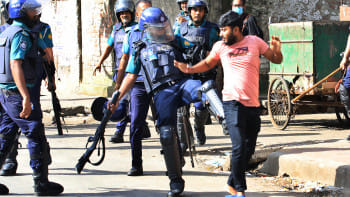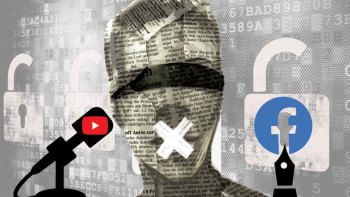How we can protect our children from state-sponsored violence

I am writing this piece as a mother of an eight-year-old to share my reaction to the reported deaths and injuries of children during the student-led protests in Bangladesh. There is no bigger tragedy in life than the death of a child. It is an inconsolable loss. We have lost dozens of our own during the protests. Dozens aged between four and sixteen. Innocent children were killed, and many more are either injured or are fighting for their lives in hospitals in a democratic country because the Awami League government thoroughly failed to keep them safe in their residential premises, their rooms, and in the arms of their parents.
In a fully functioning democratic state, the voices of young students would have been heard and respected, and safe spaces for meaningful dialogues would have been created on the issues they raised. The students would have been able to exercise their right to peaceful assembly, including the "right to hold meetings, sit-ins, strikes, rallies, events, or protests - both offline and online" without fear of harassment, violence, abuse, death, or retaliation. A democratic government would not been armed and defensive against student protesters. Sadly, what we witnessed instead was a serious breach of power and a massive violation of rights that, in addition to students and civilians, made children casualties of violence.
Our children paid the ultimate price with their bodies and their lives. In 2022, The Guardian reported the death of 58 children in Iran, some as young as eight, who were unlawfully killed by Iranian security forces during a brutal crackdown on youth-led anti-regime protests following Mahsa Amini's death. Iranian security forces have taken no responsibility for the deaths and, as per Amnesty International, have blamed most of the deaths on "terrorists" or "unknown persons."
We cannot let this happen in Bangladesh. Following the right steps, such as setting up independent oversight/investigations bodies, legal proceedings, and engagement of international bodies such as the United Nations or regional human rights commissions, has enabled other countries to bring to justice those responsible for the deaths/injuries of minors during protests. The case of "Baby Pendo" in Kenya is an example. The case is a significant one as it brings to attention the impact of police brutality during protests and the loss of innocent lives due to the use of excessive force in policing protests. "Baby Pendo" died in her mother's arms at her home during a post-election protest in August 2017. She died from injuries sustained from a blow to the head when her parents faced police brutality at their home. She was only six months old at the time of her death. Twelve police personnel were implicated in her death following investigations carried out by an Independent Policing Oversight Authority. The twelve police contested their charges over the 2017 murder of "Baby Pendo," but a few days ago, on July 25, 2024, the Kenyan High Court dismissed the petition. In dismissing the petition, the Court observed that the police commanders bear the responsibility for the actions and inactions of their juniors under their command. The trial for the twelve police commanders will take place in October 2024.
An adviser of the interim government said that they would take the initiative to hold trials of the killings that took place during the students' protest through the International Crimes Tribunal. While we welcome such moves, we must also remember human rights experts' advice, including the current United Nations Human Rights Chief Volker Türk, who called for "prompt, thorough, independent, and impartial investigations in line with internationally recognized standards" for all human rights violations during the recent protests in Bangladesh. Whether we are citizens, parents, lawyers, human rights activists, or civil society, we must remain vocal and vigilant to ensure that these standards are being applied in the investigation process of deaths and injuries of children.
Learning from international human rights standards can also help us turn our collective grief and anger into actions that, in the long haul, will ensure a safe environment for children in our country. A key part of that action should involve the re-examination of our laws and policies on freedom of assembly, the role of law enforcement and security agencies in protests including policing of protests, the deployment of weapons, the use of force and surveillance during protests, and any provisions that grant law enforcement agencies immunity from prosecution in light of international human rights standards. Re-examination of our laws and policies and their implementation should, therefore, extend to stop & search, arrests, detention, etc., during protests to prevent rights violations and abuse of minors. Unless we act on bringing about these changes, the pain from this loss will continue to stay on and haunt us. The generation that these children belonged to will never forgive us, and our inaction will leave the children of future generations exposed to the risks of rights violations, injuries, and deaths during protests/assemblies/movements. We must vow never to let that happen.
Nawmi Naz Chowdhury works in the area of international human rights law and its implementation.
Views expressed in this article are the author's own.
Follow The Daily Star Opinion on Facebook for the latest opinions, commentaries and analyses by experts and professionals. To contribute your article or letter to The Daily Star Opinion, see our guidelines for submission.

 For all latest news, follow The Daily Star's Google News channel.
For all latest news, follow The Daily Star's Google News channel. 





Comments